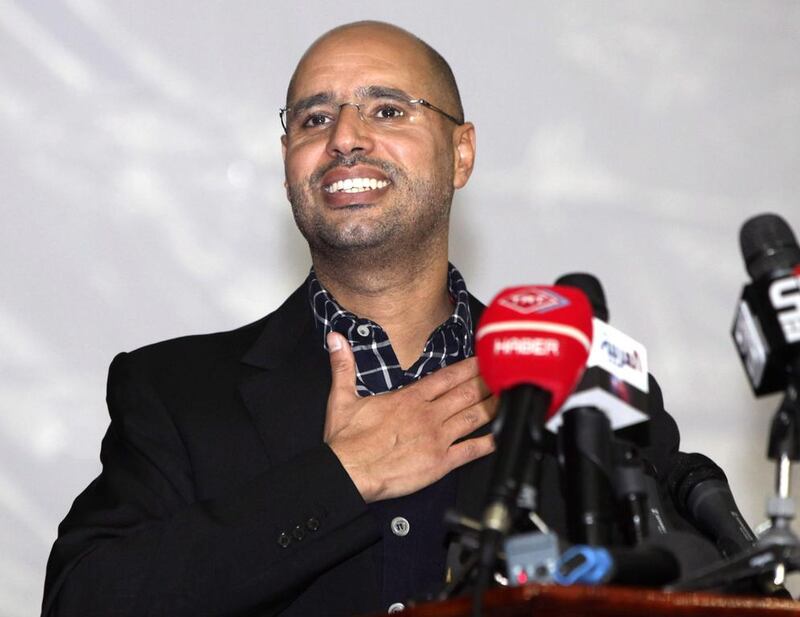On July 28, a court in Tripoli sentenced Saif Al Islam Qaddafi, the son of the late Muammar Qaddafi, to death by firing squad. He had been charged with crimes committed against fellow Libyans during the 2011 uprising which led to Nato intervention, civil war, and the murder of his father.
He was not alone in receiving a capital sentence. Eight former officials were also sentenced to death, including former intelligence chief Abdullah Al Senussi, former prime minister Baghdadi Al Mahmoudi, former military commander Mansour Dao and former external intelligence chief Abu Zeid Dorda.
Qaddafi did not attend the court proceedings, except for a short appearance via video link. He is being held in the mountainous western town of Zintan, where militias captured him in late 2011 while he was trying to flee Libya after the regime fell.
Since August 2014, Zintan has been an ally of the internationally recognised government operating out of El Beida in eastern Libya while Tripoli is controlled by the Libya Dawn-backed government of extremists and Misurata militias. It is under this government that Qaddafi and company were condemned to death. Since no world government recognises the masters of Tripoli as a legitimate authority, it is unlikely that any of them will recognise these court verdicts.
The militias in Zintan are not going to surrender their captive to face a firing squad, and the verdict is unlikely to be carried out even against those being held in Tripoli and Misurata since the country’s supreme court still has to review the verdicts and lawyers still have the right to appeal them.
Whatever outcome the legal wrangling might produce, it’s very unlikely that any of the convicted will be executed soon – if at all.
The international community and rights groups have already cast doubt on the court proceedings, questioning the fairness and independence of the judges and prosecutor. Qaddafi’s British lawyer, John Jones, described the proceedings as a “show trial” that was “run by Libya Dawn militias”. Mr Jones has been leading efforts to have Qaddafi tried before the International Criminal Court in The Hague, which issued a warrant for his arrest in June 2011.
Rights groups including Human Rights Watch and the International Bar Association have condemned the verdicts and raised doubts about the whole process.
HRW said it was a flawed trial conducted by judges and a prosecutor whose impartiality and independence were questionable. In its comments on the verdicts, the United Nations’ human rights office questioned, among other things, the court’s failure to “establish individual criminal responsibility" as well as a lack of access to lawyers, claims of ill-treatment and trials conducted without the accused being present. Indeed, Qaddafi, Al Senussi and Al Mahmoudi, were not individually linked to specific crimes but charged collectively for a list of crimes.
Domestically the verdicts caused anger and uproar. People in Sebha, Brak, Qirah, Shuwairif, in the south, and Sirte, Qaddafi’s home town, staged angry demonstrations denouncing them. Qaddafi and Al Senussi are leaders of their tribes, the Qaddafa and Magharha respectively.
The authorities had to negotiate with Al Senussi in his prison cell to calm the recent violence in his home town of Qirah in the south-east, while many among the Qaddafa tribe see Qaddafi as a rallying figure with a role to play in the future of Libya.
The head of the United Nations Support Mission in Libya, Bernardino Leon, is also displeased with the verdicts. He is rightly worried about the repercussion of the verdicts on his efforts. Since his appointment last September, he has been working with rival factions to bring about some sort of political settlement to the chaos that Libya has been living under for nearly five years.
The underlying issue is that the illegitimate government in Tripoli has no recognition. Since it took over the capital last August, chasing the elected government to the east, not a single world body or country has done business with it. Passing these verdicts, let alone carrying them out, is counterproductive to its aims.
Nearly five years since Nato helped rebel groups defeat Muammar Qaddafi’s regime, most Libyans are despairing of the chaos and lack of security that they face every day. Many of them see the recent court rulings as acts of political revenge serving no justice or reconciliation purpose. This creates the potential for wider unrest, and any wise authority in Tripoli would consider very seriously any move to execute Qaddafi and his colleagues.
Mustafa Fetouri is a Libyan analyst at PIR Center, an author and journalist





